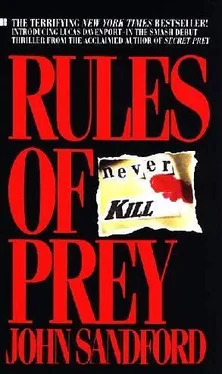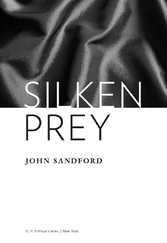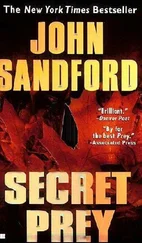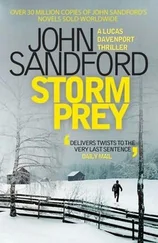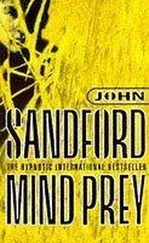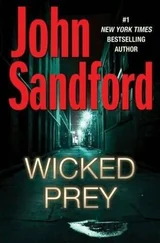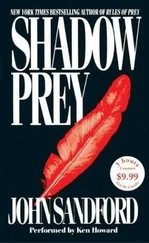"Sure. But I don't need no receipt. You're cops."
"Okay. We'll get it back to you."
Outside, Sloan said, "What?"
"I think we've got our friend Alan Nester by the short and curlies, but I also think I know what he's lying about. And it isn't the maddog," Lucas said gloomily. He opened his hand to look at the mouse. "Everything I know about art you could write on the back of a postage stamp. But look at this thing. Nester bought fifteen of them for five hundred bucks. I bet this thing is worth five hundred bucks by itself. I've never seen anything like it. Look at the expression on the mouse's face. If this isn't worth five hundred bucks, I'll kiss your ass on the courthouse lawn."
They were both peering into Lucas' hand. The mouse was exquisite, its tiny front and back legs clenching a straw, so that a hole ran between the legs from front to back. "They must have used it for something, a button or something," Lucas said.
Sloan looked up and Lucas turned to follow his gaze. A patrol car was in the street, almost at a stop, the two cops peering out the driver's-side window at them.
"They think we're doing a dope deal," Sloan laughed. He pulled his badge and walked toward the car. The cops rolled down the window and Lucas called, "Want to see a great-lookin' mouse?"
***
The Institute of Art was closed by the time they left Rice's house, and Lucas took the mouse home overnight. It sat on a stack of books in his workroom, watching him as he finished the last of the hit tables on the Everwhen game.
"God damn, I'd like to have you," Lucas said just before he went to bed. Early the next morning he got up and looked at it first thing. He thought it might have moved in the night.
It took a while to find out about it. Lucas picked up Sloan at his house. Sloan's wife came out with him and said, "I've heard so much about you I feel like I know you."
"It's all good, I expect."
She laughed and Lucas liked her. She said, "Take care of Sloan," and went back inside.
"Even my wife calls me Sloan," Sloan said as they drove away.
A curator at the art institute took one look at the mouse, whistled, and said, "That's a good one. Let's get the books."
"How do you know it's a good one?" Lucas asked as he tagged along behind.
"Because it looks like it might walk around at night," the curator said.
The search took time. Sloan was wandering through the photo gallery when Lucas returned.
"What?" he said, looking up.
"Eight thousand," Lucas said to him.
"For what? For the mouse or for all fifteen?"
"For the mouse. That's his low estimate. He said it could be twice as much at an auction. So if it's eight thousand and the others are as good, Nester paid a man dying of cancer five hundred dollars for netsukes worth something between a hundred and twenty thousand dollars and a quarter-million." He said "net-skis."
"Whoa." Sloan was nonplussed. The amounts were too big. "That's what they are? Net-skis?"
"I guess. That's what the curator was saying."
"I didn't know."
"I bet Alan Nester does."
***
They stopped at Rice's house.
"Eight thousand dollars?" she said in wonderment. A tear trickled down one cheek. "But he bought fifteen of them…"
"Mrs. Rice, I expect that when your husband asked Mr. Nester to come over here, all he really wanted was an evaluation so he could sell them later, isn't that what you told us?" Lucas asked.
"Well, I don't really remember…"
"I remember your saying that in the first interview," Sloan said insistently.
"Well, maybe," she said doubtfully.
"Because if he did, then he cheated you," Lucas said insistently. "He committed a fraud, and you could recover them."
"Well, that's what he come over for, to valuate them," Mary Rice said, nodding her head vigorously, her memory suddenly clearing up. She picked up the mouse, handling it tenderly. "Eight thousand dollars."
***
"Now what? Get a warrant?" Sloan asked. They were on the walk outside Rice's house again.
"Not yet," Lucas said. "I don't know if we have enough. Let's hit Nester first. Tell him what we've got, ask him to cooperate on the gun thing. Tell him if he cooperates, we'll let it go as a civil matter between his attorney and Rice's attorney. If he doesn't, we get a warrant, bust him, and put it in the press. How he ripped off a man who was dying of cancer and was trying to leave something for his wife."
"Oooh, that's ugly." Sloan smiled. "I like it."
***
"Where's Nester?"
The man behind the counter was small, dark, and much younger than Nester.
"He's not here," the man said. There was a chill in the air; Lucas and Sloan didn't look like customers. "Might I ask who is inquiring?"
"Police. We need to talk to him."
"I'm afraid you can't," the young man said, raising his eyebrows. "He left for Chicago at noon. He'll already be there and I have no idea where he's staying."
"Shit," Sloan said.
"When's he due back?" Lucas asked.
"Tuesday morning. He should be in by noon."
"Do you have any netsukes?" Sloan asked.
The young man's eyebrows went up again. "I believe we do, but you'd have to ask Alan. He handles all the more expensive items."
Lucas took off his coat and tossed it on the mattress. The two surveillance cops, one tall, one short, were sitting on folding chairs, facing each other, with another chair between them. They were playing gin, the cards laid out on the seat of the middle chair. One of the cops watched the window while the other surveyed his hand. They were good at it. Their shift covered the prime time.
"Nothing?" asked Lucas.
"Nothing," said the tall cop.
"Anything from the cars?"
"Not a thing."
"Who's in them?"
"Davey Johnson and York, up north, behind McGowan's. Sally Johnson and Sickles, out east. Blaney is over on the west side with a new guy, Cochrane. I don't know him."
"Cochrane's that tall blond kid, plays basketball in the league," the short cop chipped in. He fanned his cards, dropped them on the seat of the chair between them, and said, "Gin."
A radio against one wall played golden-oldie rock. A police radio sat silently next to it.
"He's about due," Lucas said, peering out into the street.
"This week," the short one agreed. "Which is odd, when you think about it."
"What's odd?"
"Well, one of the notes he left said something about 'Don't set a pattern.' So what does he do? He kills somebody every two weeks. That's a pattern if I ever saw one."
"He kills when he needs to," Lucas said. "The need builds up, and eventually he can't stand it."
"Takes two weeks to build up?"
"Looks like it."
The police radio burped and all three of them turned to look at it. "Car," it said. And a moment later, "This is Cochrane. It's a red Pontiac Bonneville,"
The tall cop leaned back, picked up a microphone, and said, "Watch it. It's the right size, even if it's the wrong color."
"Coming your way," Cochrane said. "We got the tag, we'll run it."
Lucas and the surveillance cop watched the car roll down the street and ease to the curb two houses down. It sat with its lights on for one minute, two, and Lucas said, "I'm going down there."
He was at the stairs when the tall cop said, "Hold it."
"What?"
"It's the girl."
"High-school girl down the street," said the short cop. "She's going up to the house now. Must be a date."
Lucas walked back in time to see her going through the porch door. The car left.
***
"Could be something going on with her phones," the short cop said a while later. The phone-monitoring station was at the other surveillance post, behind McGowan's house.
Читать дальше
